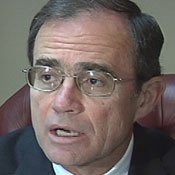Early childhood education is central to safeguarding Mississippi's economic future agreed Republican Secretary of State Delbert Hosemann and Democratic Attorney General Jim Hood in separate speeches today. The two officials' comments, coming during the Mississippi Economic Council's annual Hob Nob event, are indicative of growing, bipartisan support for pre-kindergarten.
"If I were running for governor, that would be the premier the issue I'd run on," Hood said, before adding that he is running for re-election as attorney general and not for governor. "That issue is the most important economic development issue we're facing."
"Early childhood education is an absolute necessity for Mississippi," Hosemann said in a speech immediately following Hood's. "If we don't have that, we stand the opportunity of losing a generation."
Mississippi is currently the only southern state without a state-funded pre-K program. The state's business community has advocated for early childhood education with increasing intensity, though. Mississippi Building Blocks, a pilot early childhood program, has received funding from a variety of private corporate sources.
While calling early childhood education "absolutely critical" to the state's future prosperity, Hosemann skirted the issue of how to fund pre-K. He repeatedly stated his opposition to tax increases in the upcoming year.
"We do not need to increase the size of the tax pool by draining the money from individuals and businesses," Hosemann said. "We need to have state government function on the dollars that it's getting now."
Hosemann also described plans to introduce intellectual property reform legislation in the upcoming legislative session. The proposed reforms would include tax credits for companies that contract with state universities and junior colleges to "use the built-up intellectual capital we've got in our state and put it in the private sector," Hosemann said.
Contracts between corporations and higher-education institutions could benefit both parties by bringing innovation to companies and much-needed funds to universities, he added.
Calls for tax increases were nearly nonexistent at the event. Rep. John Mayo, D-Clarksdale, offered a mild suggestion that the state raise additional revenue to offset some of the budget cuts that will be necessary in 2011.
"I would hope there's some room where we could combine cuts with some other revenue streams," Mayo said, speaking in lieu of House Speaker Billy McCoy, D-Rienzi.
Mayo added that without the padding of added revenue, cuts at the state level would necessitate tax increases at other levels. Counties and municipalities may need to raise property taxes to maintain school-district funding, while cuts to higher education and community colleges would force tuition increases, serving as a "back-door tax increase" on middle-class families, Mayo argued.



Comments
Use the comment form below to begin a discussion about this content.
comments powered by Disqus